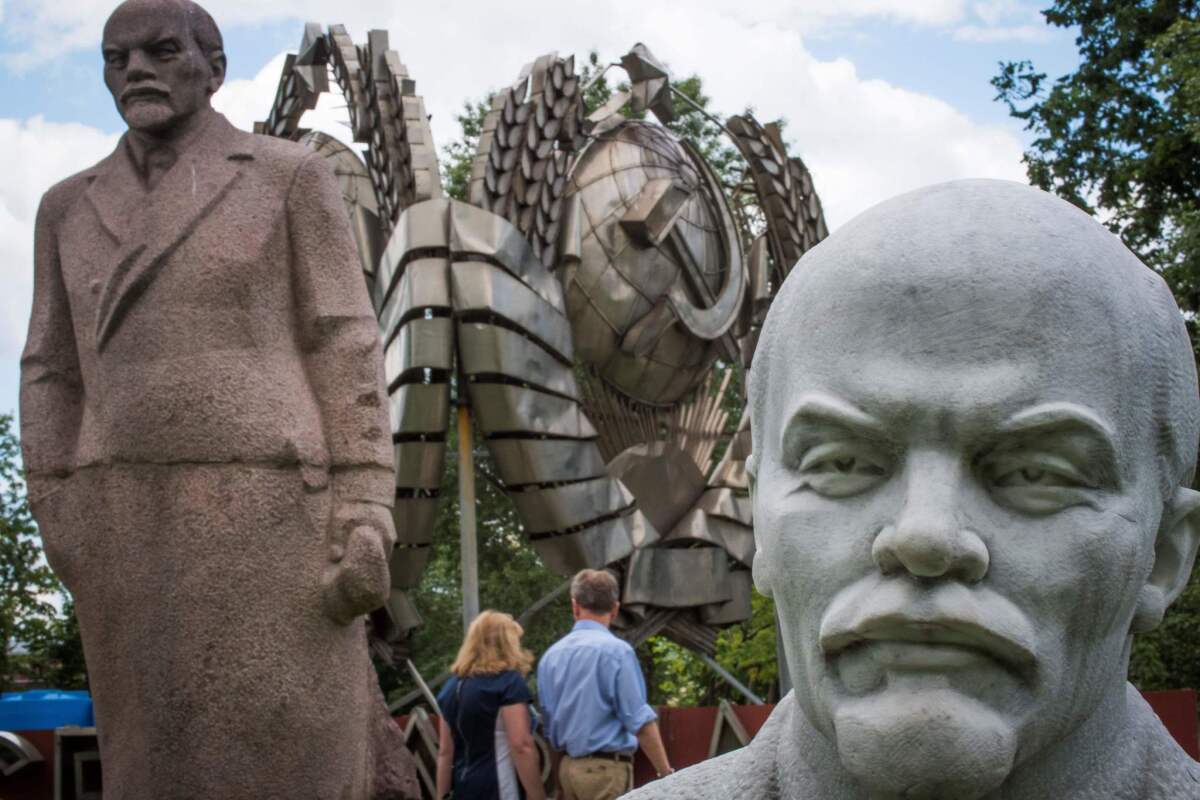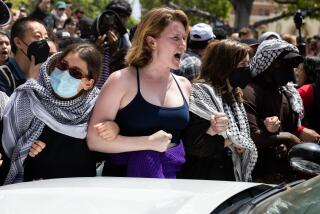Op-Ed: Hashtags from my Soviet childhood

- Share via
Browsing through a trendy boutique in Culver City recently, I came across a framed sign that said “Equality.” It was pink and perched above a shelf with neatly folded jeans on sale for $450 a pair. I took a photo and laughed until it hit me — this was no laughing matter. Not long after, I visited a private school in Santa Monica where posters, done in a child’s hand, said “Join the Young Proletariat Club — Support the Revolution!”
We now live in a realm of buzzwords, hashtags, slogans that can seduce us with the neatness of tidily packaged concepts in our desire for change. But “equality,” ”revolution” and “proletariat” are rendered meaningless in environments where they are overused. We’ve entered an age of Newspeak — though, unlike in “1984,” this is not part of government indoctrination but our own doing.
Having spent my childhood in the Soviet Union in the 1980s, I’ve inherited a knee-jerk reaction to slogans. Soviet buzzwords were the foundation of our reality, overseen by the holy trinity of Marx, Engels and Lenin.
One became a Young Pioneer after three years in the preparatory ranks of the Little Octobrists. We wore baby Lenin pins on our brown, itchy wool uniforms. You can still buy such a pin in Brighton Beach.
Back then, exchanging the pin for the red polyester kerchief of the Young Pioneer felt like an exciting rite of passage into a world of adolescence: unironic meetings, pompous speeches, fortissimo tuba marches. The initiation ceremony meant standing for hours under the hot sun, next to the granite Grandpa Lenin, while the district party official expounded on the five-year plan. Then, a teenager with vodka breath — from the Komsomol ranks! — tied the red kerchiefs around our necks. We would have given our lives at that moment for “Proletariat!” “Revolution!” “Equality!” To our parents, these words meant dreary lines for bread, bribes and crammed communal apartments at best; and denouncements, arrests and murder of millions at worst.
My family immigrated to the U.S. in 1989. Soon after, in 1991, the Soviet empire fell, eventually replaced by the dictatorship we know today.
Just after the Soviet collapse, we returned to Moscow, where I was to compete in the first International Tchaikovsky Competition for Young Musicians. I represented the U.S., playing, among other things, Gershwin’s “Rhapsody in Blue,” the solo piano version.
We stayed in the historic Hotel Moskva, built during the Stalin Terror years, near the Moscow Conservatory where the competition took place and the Kremlin. Provincial Communist Party bosses stayed there when visiting the capital, my dad explained. And now, look at us, penniless Jewish immigrants from Odessa, back to the capital as citizens of the world, making it here without any “blat”! (i.e. connections, political or monetary).
We stepped outside the hotel into Manezhnaya Square. A hot air balloon emblazoned with “Glory to Russia!” was prepped for takeoff. Veterans with medals were jogging in a circle around it and singing Soviet anthems, and nearby, a military band in full uniform was getting ready to play. The conductor raised his baton, but instead of a Soviet military march, the band broke into a medley from “My Fair Lady.” The confused city was still steeped in a time when slogans promised meaning and didn’t deliver.
At the conservatory, I sat on the floor in my jeans, like a renegade, surrounded by the Russian contestants in their frilly dresses and stiff shirts. I heard murmurs, “No culture … what do you expect from an American.”
In my semifinal performance, I bopped, perhaps excessively, to the music’s jolly tunes, a newly American smile on my face. The Russian public loved it, but the stone-faced judges didn’t get it. I was crushed when I didn’t make the final round. The Soviet megalith was gone, but its ways had stayed.
As I ran my fingers over the $450 jeans at the boutique, I recalled that surreal scene in Moscow, the meeting of the free West with the oppressed East, its slogans now a Felliniesque pastiche. The multiple shades of human experience cannot be reduced to empty Newspeak buzzwords — nor should ideals like equality and democracy.
Inna Faliks is a concert pianist and professor and head of the piano department at UCLA Herb Alpert School of Music.
More to Read
A cure for the common opinion
Get thought-provoking perspectives with our weekly newsletter.
You may occasionally receive promotional content from the Los Angeles Times.










